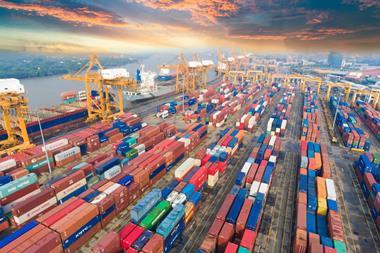Loss of ‘zombie companies’ is part of a ”return to normal” as firms face commodity price pressures - Atradius
Despite a return to normal for many economies in 2022, insolvencies are set to rise reports Atradius.
In its latest Insolvency Forecast report, it predicts that the global economy will emerge gradually from the Covid pandemic in 2022, with restrictions unwound in most countries and regions.
But despite a return to normality for many, the trade credit insurer reports that most of the gains to be seen from re-opening these economies have already been exploited.
And with the winding down of restrictions comes an end to government support which is likely to contribute to an increase in insolvencies globally.
Commodity inflation a concern
Global GDP growth is also expected to slow in 2022. Supply chain bottlenecks combined with rising consumer demand and the impact of the war in Ukraine will each play a role in increasing price pressures.
Despite these challenges, Atradius reports that any recession in 2022 is unlikely with the main impact of Russia’s invasion of Ukraine likely to increase costs of commodities.
The report estimates global inflation in 2022 to be 6.1%, negatively impacting consumers’ purchasing power and global GDP growth, which is expected to moderate to 3.4% in 2022, compared to 5.9% in 2021.
Nicola Harris, senior underwriter at Atradius, said: “The last two years were certainly unprecedented. As we emerge from the pandemic and economies start to bounce back, we will enter a global period of adjustment. That’s what we’re starting to see now.
”The amount of government support that was available to help businesses through the pandemic – not just here in the UK but globally – surpassed anything we’d ever seen.
“One of the results of this support was a strong decline in insolvencies – globally, they fell by a cumulative 29% in 2020-21.
“Those government measures didn’t just protect viable businesses, but also helped to create ‘zombie companies’ – businesses we would have expected to default during pre-pandemic times, but that have been able to keep going for longer thanks to the support they’ve received.
”In many ways, the rise in insolvencies we’re expecting to see this year is a part of the return to normal.”
In its report, Atradius outlines countries where insolvencies are expected to rise, remain stable or decrease over the coming year.
In some markets including Spain, Italy and the Czech Republic, a partial return to normality in 2021 resulted in an earlier rise in insolvency, for many of these markets insolvencies are expected to remain relatively stable in 2022.
Prepare for the unexpected
For the majority of markets, Atradius expects the adjustment to take place in 2022 and 2023 with insolvencies rising in line with the phased end of government support.
Two outliers are New Zealand and Hong Kong, where insolvencies are expected to decrease in 2022. Atradius reports that this is due to continuing fiscal support, which is estimated to extend until the end of 2022. This is likely to result in an inflated growth rate, the highest across all markets in 2023.
Harris continued: “There are, of course, some additional factors at play here – the big one being the Russian invasion of Ukraine. We’re expecting to see a significant increase in insolvencies in Russia in 2022, in part due to the economic recession as a result of sanctions that have been imposed in response to the war in Ukraine.
”The eurozone is heavily reliant on Russia for energy, so European countries are likely to be some of the worst impacted by the conflict and a resulting increase in energy prices.
“Beyond 2023, we expect that insolvency levels will have largely returned to normal. As a result, we’ll either see them start to decline or remain constant. In the coming years, businesses will have to adjust to an environment without significant government support.
”For some, which may have taken up a lot of debt during the pandemic, this could be a challenge. In the face of uncertainty, managing risk has never been more important.
”If there’s one thing we’ve learned over the past couple of years, it’s to make sure your business is protected, and prepared for the unexpected.”




















No comments yet